This week, you will assess a research article on psychotherapy for clients with addictive disorders
Assignment: Psychotherapy for Clients With Addictive Disorders
Week 8: Psychotherapy for Addictive Disorders
A long-standing debate has roiled over whether addicts have a choice over their behaviors. The disease creates distortions in thinking, feelings, and perceptions, which drive people to behave in ways that are not understandable to others around them. Simply put, addiction is not a choice. Addictive behaviors are a manifestation of the disease, not a cause.
—Dr. Raju Hajela, former president of the Canadian Society of Addiction Medicine
A common misconception is that addiction is a choice, and addicts are often labeled as individuals who lack morals, willpower, or responsibility. However, addiction is a clinical disorder that must be treated with the support of a health care professional. Although many people who are exposed to potentially addictive substances and behaviors continue life unaltered by their experiences, some people are fueled by these experiences and spiral out of control. In your role as the psychiatric-mental health nurse practitioner, you must be prepared to not only work with these individuals who struggle with addiction but also help them and their families overcome the social stigmas associated with addictive behavior.
This week, you will assess a research article on psychotherapy for clients with addictive disorders. You also examine therapies for treating these clients and consider potential outcomes. Finally, you will discuss how therapy treatment will translate into your clinical practice.
Learning Objectives
Students will:
- Analyze literature on interventions and therapeutic approaches used for treating clients with addictive disorders
- Evaluate the application of current literature on addiction treatment to clinical practice
To prepare:
- Review this week’s Learning Resources and consider the insights they provide about diagnosing and treating addictive disorders. As you watch the 187 Models of Treatment for Addiction video, consider what treatment model you may use the most with clients presenting with addiction.
- Search the Walden Library databases and choose a research article that discusses a therapeutic approach for treating clients, families, or groups with addictive disorders.
The Assignment
In a 5- to 10-slide PowerPoint presentation, address the following. Your title and references slides do not count toward the 5- to 10-slide limit.
- Provide an overview of the article you selected.
- What population (individual, group, or family) is under consideration?
- What was the specific intervention that was used? Is this a new intervention or one that was already studied?
- What were the author’s claims?
- Explain the findings/outcomes of the study in the article. Include whether this will translate into practice with your own clients. If so, how? If not, why?
- Explain whether the limitations of the study might impact your ability to use the findings/outcomes presented in the article.
- Use the Notes function of PowerPoint to craft presenter notes to expand upon the content of your slides.
- Support your response with at least three other peer-reviewed, evidence-based sources. Explain why each of your supporting sources is considered scholarly. Provide references to your sources on your last slide. Be sure to include the article you used as the basis for this Assignment.
Learning Resources
Required Readings (click to expand/reduce)
American Psychiatric Association. (2013). Diagnostic and statistical manual of mental disorders (5th ed.). https://doi.org/10.1176/
appi.books.9780890425596
- For reference as needed
Wheeler, K. (Ed.). (2020). Psychotherapy for the advanced practice psychiatric nurse: A how-to guide for evidence-based practice (3rd ed.). Springer Publishing.
- Chapter 9, “Motivational Interviewing”
- Chapter 19, “Psychotherapeutic Approaches for Addictions and Related Disorders”
Required Media (click to expand/reduce)
AllCEUs Counseling Education. (2017, November 4). 187 models of treatment for addiction | Addiction counselor training series [Video]. YouTube. https://www.youtube.com/watch?
v=eQkA0mIWx8A
Expert Answer and Explanation
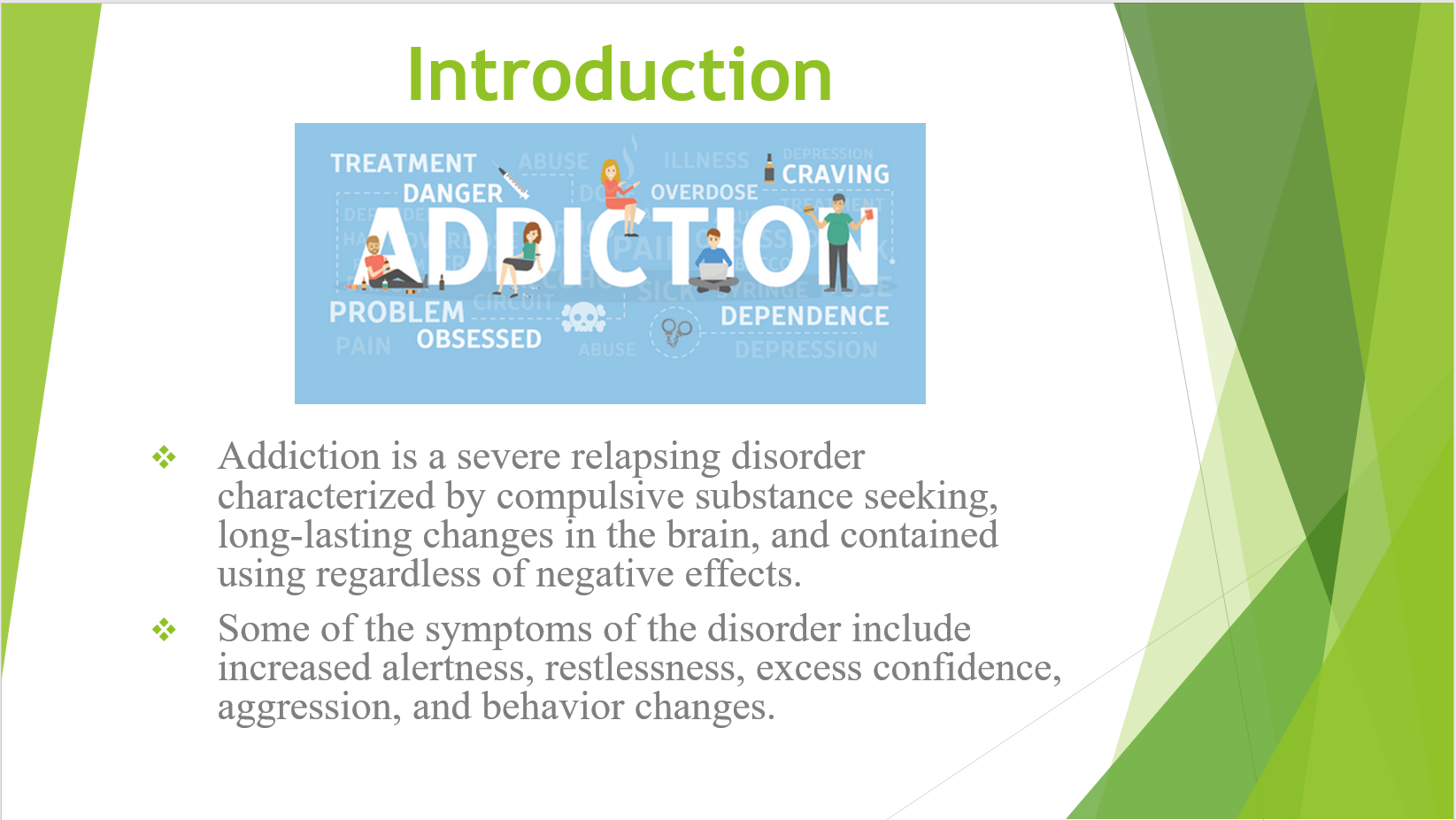
Addiction is a severe relapsing disorder characterized by compulsive substance seeking, long-lasting changes in the brain, and contained using regardless of negative effects. Addiction is seen as a both mental and brain complex disorder. Some of the symptoms of the disorder include increased alertness, restlessness, excess confidence, aggression, and behavior changes. The disorder is difficult to understand, but treatable. This presentation has discussed family therapy, an evidence-based therapeutic approach used to treat addiction.
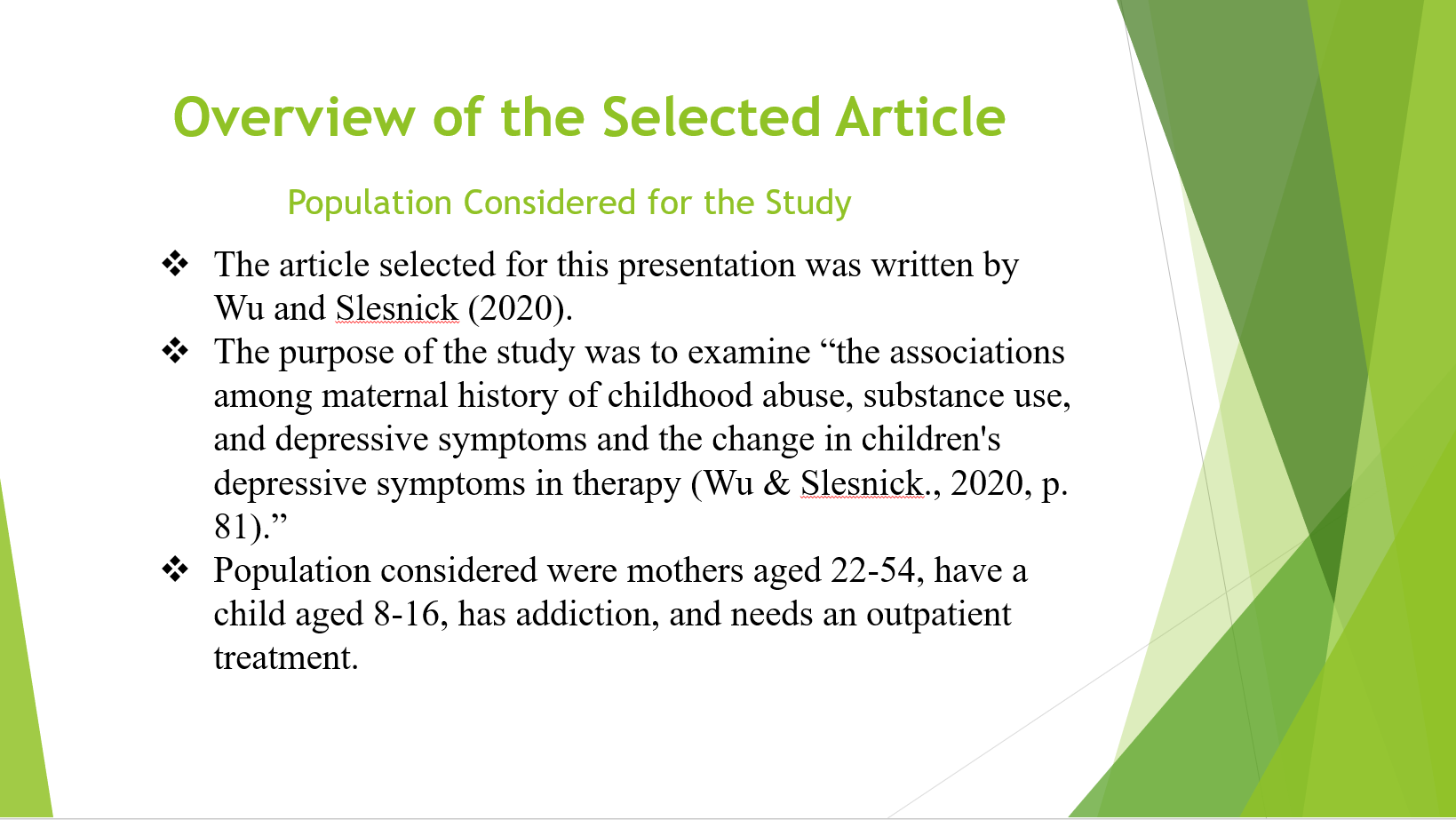
The article selected for this presentation was written by Wu and Slesnick (2020). The purpose of the study was to examine “the associations among maternal history of childhood abuse, substance use, and depressive symptoms and the change in children’s depressive symptoms in therapy (Wu & Slesnick., 2020, p. 81).” The authors randomly assigned mothers into either individual or family therapy.
The family therapy was the intervention of the study. The population considered for the study were a total of 183 mother-child pairs. Mothers were to have drug or alcohol use disorder as highlighted by the DSM–IV, have a biological child aged 8-16, and is in need to an outpatient treatment for substance abuse. The mothers aged between 22-54.
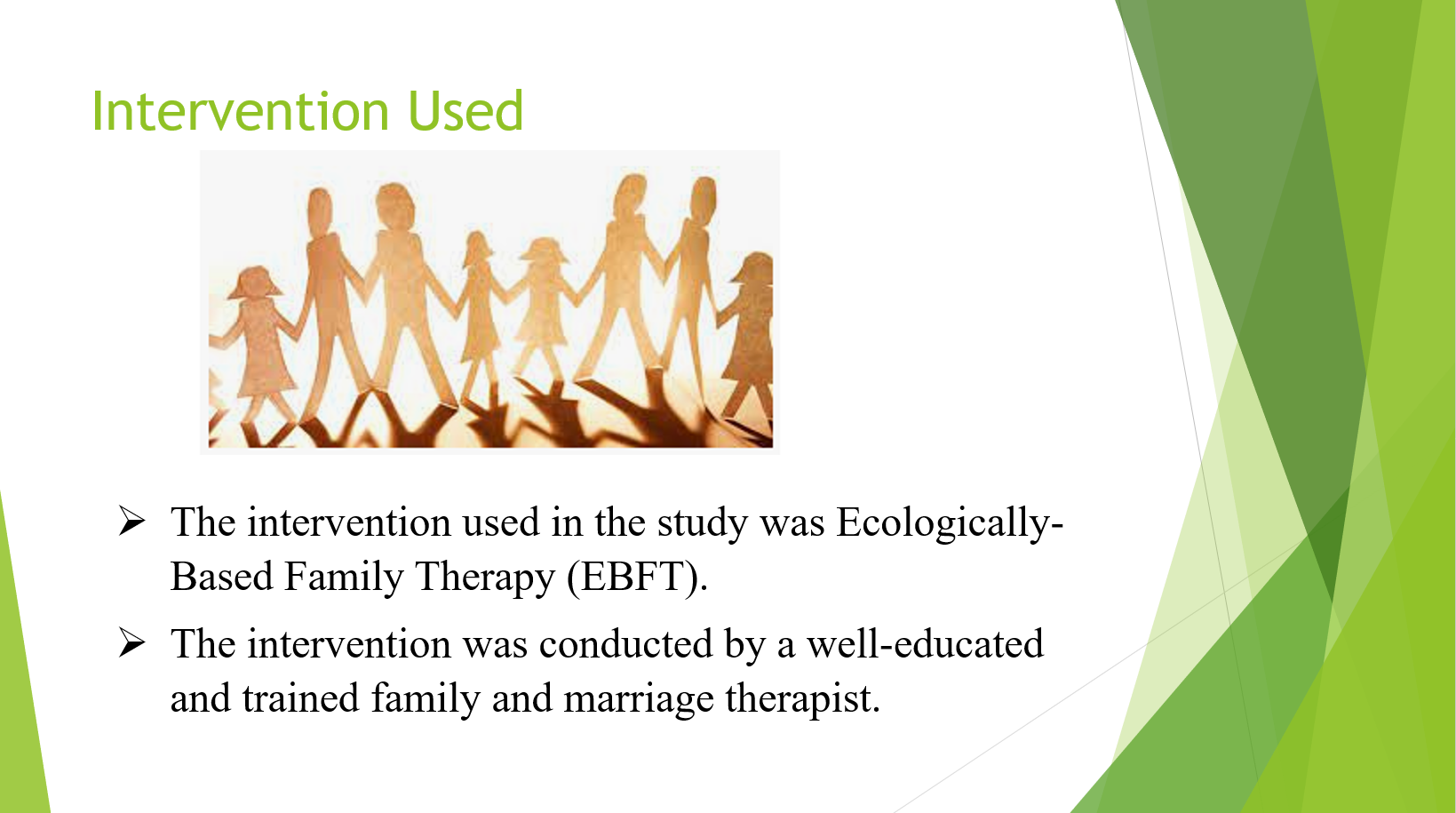
The intervention used in the study was Ecologically-Based Family Therapy (EBFT). The intervention was conducted by a well-educated and trained family and marriage therapist. Family therapy is a type of psychotherapy which aims to improve family relationships by resolving conflicts and strengthening communication. Family therapy is not a new intervention.
You et al. (2020) are among the researchers who have studied this intervention. The authors found in their study that family therapy improved family functions and decreased substance cravings among patients with substance abuse disorders. Garrido‐Fernández et al. (2017) also conducted a study and found that family therapy is an effective psychotherapy for reducing severity of addiction.
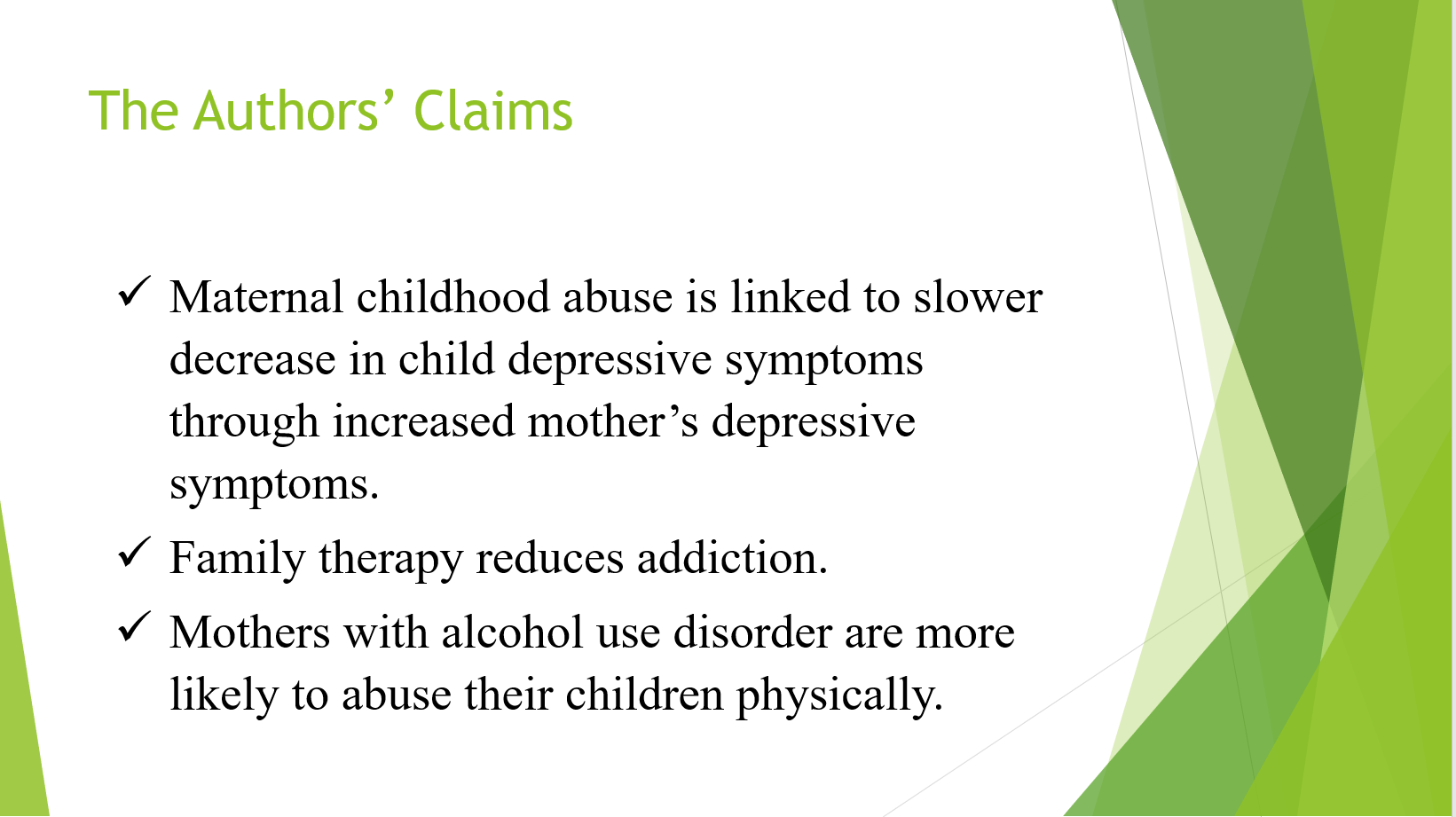
The authors had various claims. The first claim was that maternal childhood abuse is linked to slower decrease in child depressive symptoms through increased mother’s depressive symptoms. The second claim is that mothers with alcohol use disorder are more likely to abuse their children physically compared to their substances. The Last claim is that family therapy improves parenting, maternal functions and decrease substance abuse use compared to individual therapy.
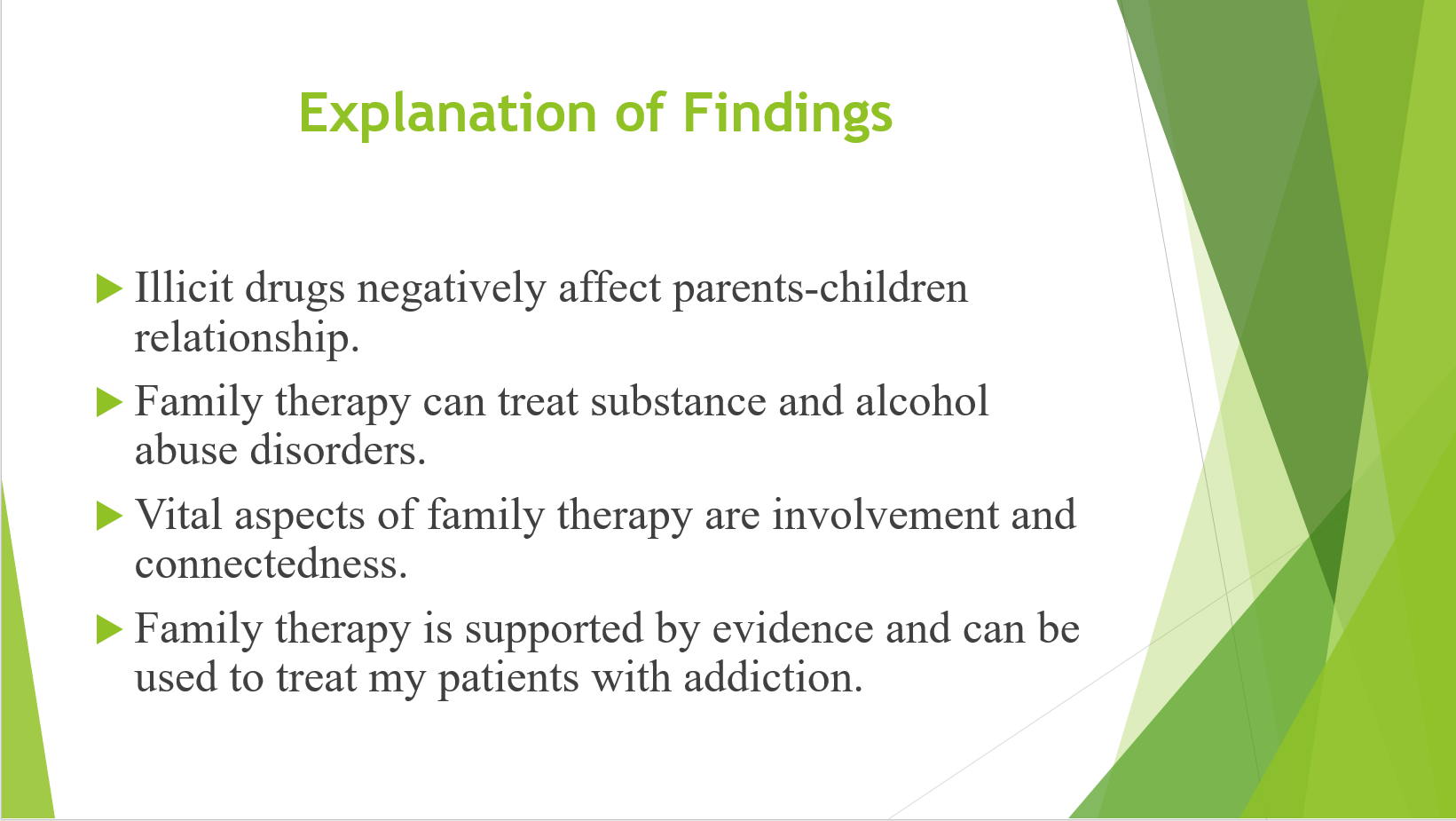
One of the findings was that maternal cocaine and marijuana use were linked to a child’s depressive symptoms. In other words, children whose mothers were taking illicit drugs or alcohol were more likely to develop severe depressive symptoms, and this negatively impacted their relationship. The study also found that family therapy can improve parent-child relationship and as well as reduce substance abuse than individual therapy.
They recommended that therapists using family therapy should ensure and promote involvement and connectedness among parents and their children for better results. The findings of the study are consistent with other studies, and thus can be translated to practice with my clients. Garrido‐Fernández et al. (2017) reported that family therapy can reduce addiction. Ahmad-Abadi et al. (2017) also found that family therapy can reduce patients with substance abuse disorder’s dependence on alcohol or drugs.
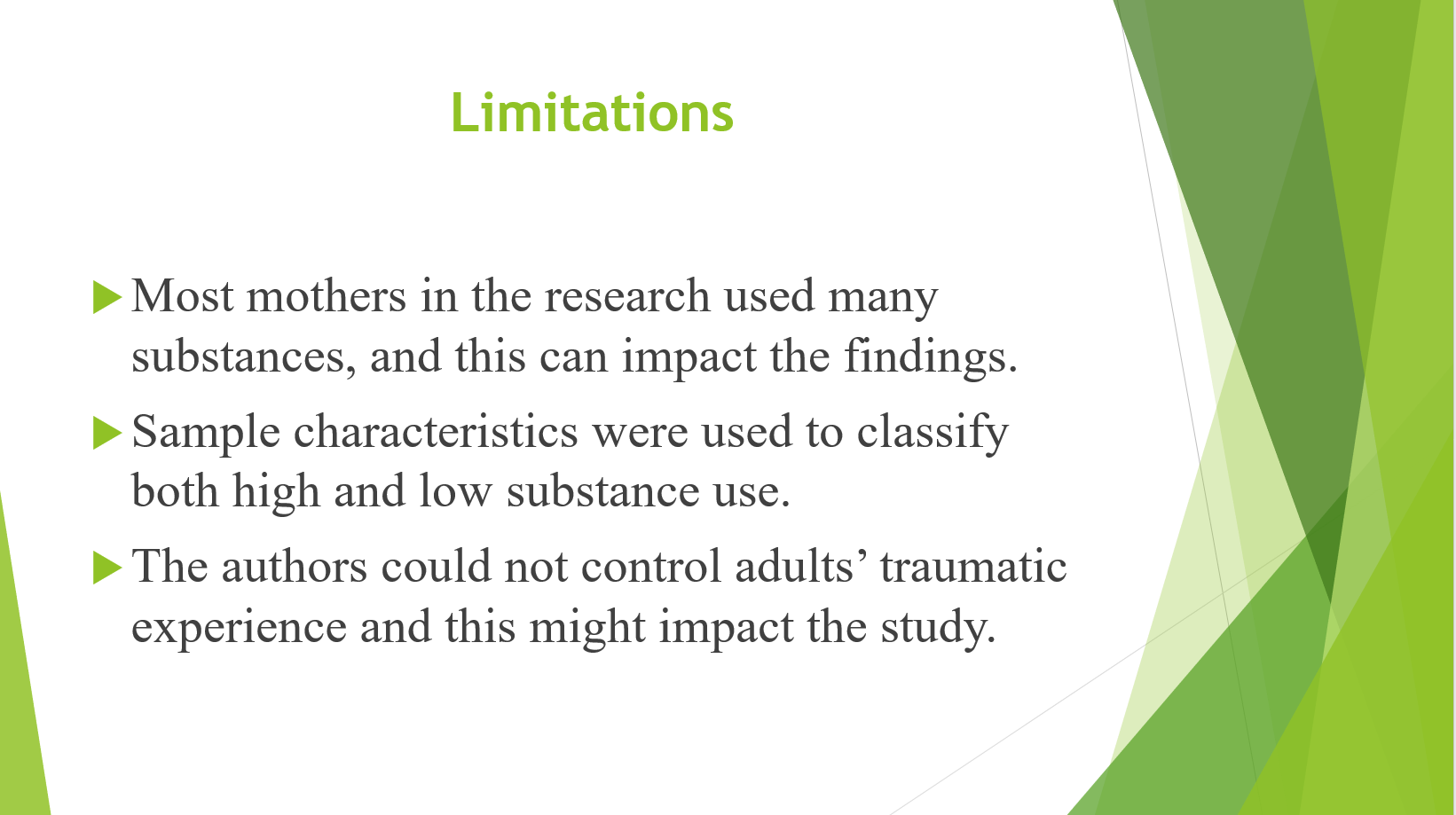
The first limitation of the study was that most mothers in the research used many substances, and this can impact the findings. The second limitation was that sample characteristics were used to classify both high and low substance use. Lastly, the authors could not control adults’ traumatic experience and this might impact the study.
These limitations will not impact my ability to use the findings because the study has various strengths to counter them. The first strength is that the study applied randomized control trial, Second, they manually tested interventions that have been empirically supported.
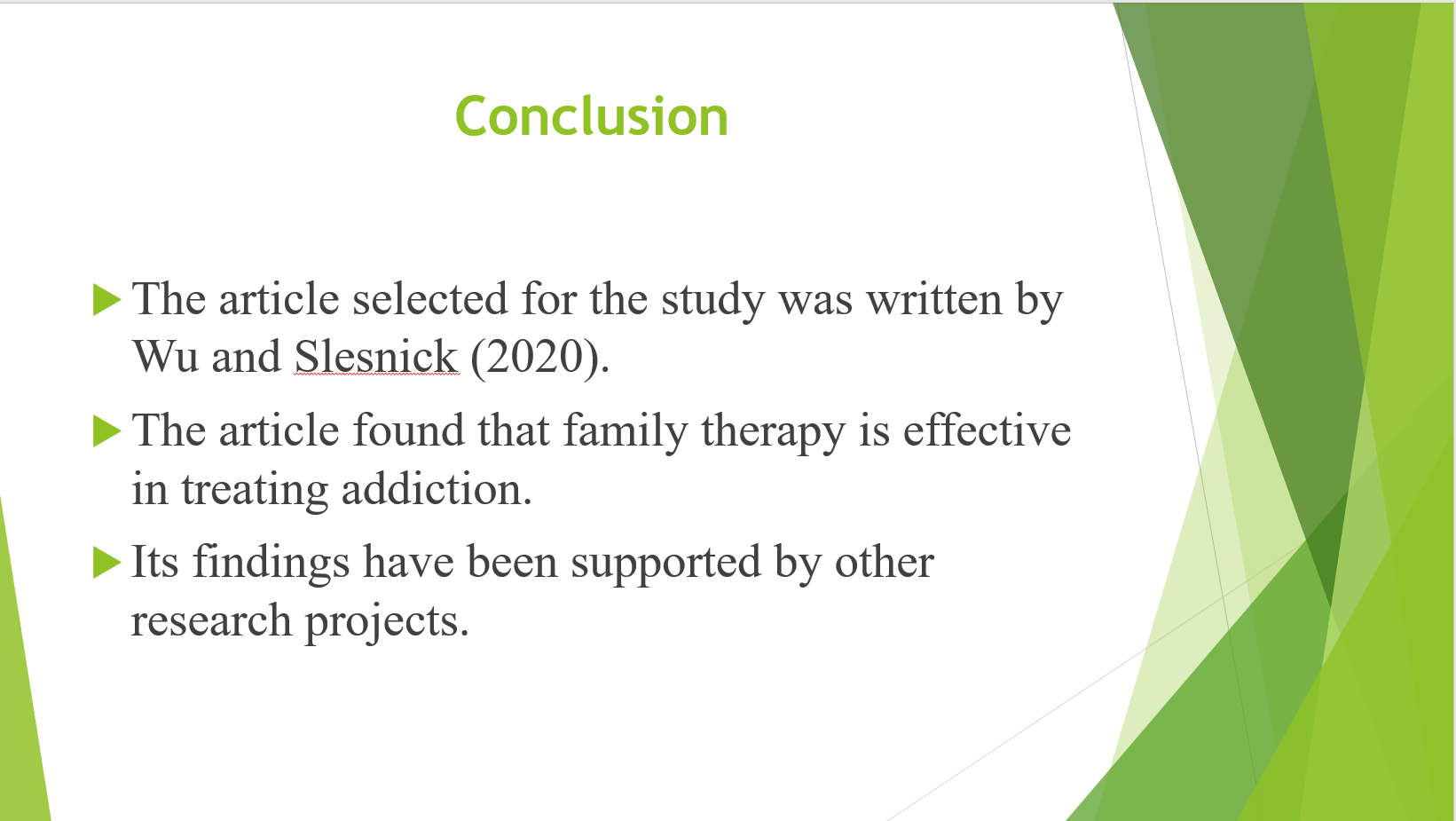
The findings by Wu and Slesnick (2020) have been discussed in this presentation. The authors found that family therapy is a positive and lasting impact on patients with substance abuse disorders. They noted that addiction reduced among participants under family therapy. Garrido‐Fernández et al. (2017) support the article’s findings. They reported that family therapy can reduce addiction. Ahmad-Abadi et al. (2017) also found that family therapy can reduce patients with substance abuse disorder’s dependence on alcohol or drugs.
Place your order now for a similar assignment and get fast, cheap and best quality work written by our expert level assignment writers. Use Coupon Code: NEW30 to Get 30% OFF Your First Order
Use Coupon Code: NEW30 to Get 30% OFF Your First Order
FAQs
- Which psychotherapeutic approach is most effective for treating addiction?
-
What does research on psychotherapy suggest it?


